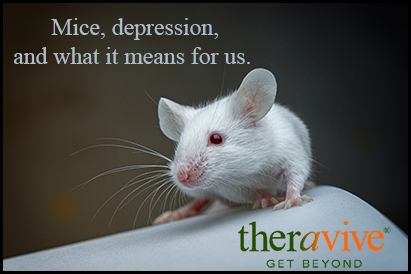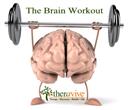August 7, 2014
by Dr. DeeAnn Visk

Studies have shown that depression-like behavior in mice correlates with abnormal electrical activity in the brain. By modulating these electrical signals, researchers have fixed the brains of these mice and returned their behavior to normal. Scientists were startled to find that cells in the brain have an inborn ability to modulate their electrical signals back at a more normal pattern.
[More]
February 20, 2014
by Christie Hunter

There are many great activities you can engage in every day to trigger the loop between brain matter and brain behavior. Even until old age, the brain is willing to learn new things if you are.
[More]
January 3, 2014
by Christie Hunter

Alzheimer’s Disease, a form of dementia, is a progressive brain disease and is the 6th leading cause of death in the United States. Sufferers live an average of eight years after symptoms become noticeable, but may live up to twenty years after symptoms manifest themselves.
FB- Alzheimer's Disease is a scary word for aging adults and their loved ones. Learn the symptoms and multicomponent approach to battling this disease in this latest blog entry from Theravive.
[More]
September 5, 2013
by Ashley Marie

It’s 11pm. Now 12am. Now 1am. Now 2am. Now 3am.
And you still haven’t fallen asleep.
During those sleepless hours, you might feel like the whole world is asleep – except you. But you are not alone.
In 2010, it was reported that the demand for sleeping pill prescriptions boosted by 60% in the United States.[1] Moreover, one in three Americans has difficulties falling asleep, and more than 35 million have chronic insomnia.
A Brief History of Insomnia
There is an intriguing relationship between insomnia and historical developments. As outlined by Summers-Bremner, certain events of the human story have contributed to our propensity to become insomniacs.[2] In the 1700s, the European Baroque culture led to a greater appreciation of modern nightlife, thereby interrupting regular sleep patterns. Historians especially point to industrialization as a dominant variable that led groups of society – even cities – to become victims of tiresome, sleepless nights. The developments of gas, electric lighting, the increasing popularity of nighttime entertainment, and evermore-busy schedules have turned our sleep into an utter nightmare. For these reasons, urban cities are especially connected with the rise of insomnia. It is not surprising, then, that the popular Hollywood film, Sleepless in Seattle, takes place in an urban setting.
My Experience with Insomnia
Like you, I too have suffered from insomnia. I am all too familiar with the cycle of fearing that I will not fall asleep, not falling asleep, and then dreading that I will wake without ever having slept.
I have laid down in bed and calculated how many coffees or teas I should have the next day,just to get through the first few hours of the morning. I have also planned out when I can squeeze in a quick 15-minute nap to give me the energy needed to last the rest of the day. And I have felt hopeless by thinking that my insomnia had no cure.
But following the advice of my counselor, I made a few small changes in my diet, exercise, schedule, and thought patterns. I eventually discovered that I could enjoy the blessing of a restful sleep.
Defining Insomnia
Doctors have defined three main types of insomnia.[3]
Transient Insomnia
The first of these is transient insomnia. This category of insomnia involves troubles sleeping for only a night or two. For example, you might not sleep as well on the night before an exam, or the night before an important meeting, or the night after a heated argument with your loved one.
Short-Term Insomnia
Secondly, short-term insomnia occurs when you cannot sleep well for a few days or even a few weeks. This could be because you are stressed about work, suffering from relationship issues, or getting over jet lag.
Chronic (or Acute) Insomnia
Thirdly, chronic insomnia involves troubled sleep patterns that last for months or years. Unfortunately, this category of insomnia can lead to or be caused by mental health issues, notably depression and anxiety.
Insomnia and Mental Health Issues
Depression
One of the key mental health issues associated with insomnia is depression.[4] Signs of depression include irritability, a short temper, decreased motivation, an inability to concentrate, hopelessness, increased crying, and a lack of fulfillment in things that you would typically enjoy.
Sometimes it is difficult to trace the causal relationship between insomnia and depression. Did your insomnia cause your depression or did your depression cause your insomnia? If you are unsure of the answer, it is a good idea to discuss this with a counselor. Addressing this question can help you identify the root of your insomnia, which can help you along the path to more restful nights.
Anxiety
In addition to depression, anxiety can also be intimately related to insomnia.[5] Signs of anxiety include an inability to relax, dizziness, nausea, excessive fears, nightmares, and hot or cold sweats.
Anxiety can also lead to a perpetual cycle of feeling anxious about not sleeping and then not sleeping due to your anxiety.
If you struggle with anxiety and insomnia, then cognitive behavioral therapy is a helpful method of treatment. By seeking the help of a mental health professional, you can help identify the root of your anxiety, as well as effective coping techniques.
Seeking Help from a Mental Health Professional
Insomnia can be a lonely experience, but there are mental health professionals who can walk alongside you in your search for a restful sleep.
You know that simply counting sheep does not solve the issue. You also might feel that your insomnia is related to a deeper issue – the most common being either depression or anxiety. If you can’t sleep, then rest assured that there are counselors and therapists who can help you discover techniques, medications, and lifestyle changes that can help you restore your sleep. I’ll let you sleep on that.
[1] Kornblatt, S. 2010. Restful Insomnia. San Francisco: Red Wheel.
[2] Summers-Bremner, E. 2008. Insomnia: A Cultural History. London: Reaktion Books.
[3] Kornblatt, S. 2010. Restful Insomnia. San Francisco: Red Wheel.
[4] Silberman, S.A. 2008. The Insomnia Workbook. Oakland, CA: New Harbinger Publications.
[5] Ibid.
August 21, 2013
by Ashley Marie

WEDNESDAY WISDOM
Our world has been shaped by the brilliance of both male and female minds. Notable men include Sir Isaac Newton, Albert Einstein, Leonardo da Vinci, and Sigmund Freud. And notable women include Charlotte Brontë, Margaret Thatcher, Barbara Walters, and Caroline Herschel.
However, it remains a relatively taboo question to ask whether there are differences between the male and female brain. And this fear is not to be belittled. We face concerns about the mistreatment of women in the workplace, as well as abuses stemming from prejudices against another gender. These issues can produce a power imbalance between men and women, and this has historically been problematic for women.
But the above question should not be dismissed, as answering the question can help us understand the advantages of both sets of brains. This article will analyze the differences between male and female brain structures and then explore two areas in which men and women show distinct cognitive differences.
Differences in Brain Structures
The adult brain consists of approximately one hundred billion neurons and typically weighs between 2.25 and 3.5 pounds of dense matter.[1]
The brain has three principal layers.
The first of these is the brain stem, which is the bottom layer. This part of the brain is connected to the spinal cord. The brain stem is more primitive, as it is responsible for our instincts and our responses to immediate crises. Male brains tend to activate this part of the brain more often than women, which is why they are more likely to respond physically in cases where they feel threatened.
Secondly, the limbic system is the middle layer, which is where emotions are processed. The amygdala is part of the limbic system, and this tends to be larger in males, making them typically more aggressive than females.
Thirdly, the cerebral cortex is the top layer, which is where we use our cognitive skills. The left side is responsible for language skills. The right side is responsible for spatial skills, including mathematics. The following section examines both of these cognitive functions, which are especially different for men and women.
Language: Women Take the Lead
There are differences between male and female brains at a mere 26 weeks of pregnancy.[2] Scientists have found that the corpus callosum – a bundle of nerve tissues that connect the left and right parts of the brain – is actually thicker in female fetuses than male fetuses.
Dr Denckla from the Kennedy Krieger Institute, concludes that women have language functions in both the left and right hemispheres of the brain. This means that when women take part in a language-based activity, such as reading a poem, they use both sides of the brain. Men, however, only use the left side.
Similarly, Dr Geary from the University of Missouri claims that the way our brains are shaped affects the skills that we tend to enhance.
Fine motor skills associated with language learning, such as handwriting, tend to mature in girls six years prior to boys.
Jane Austen, Emily Dickinson, Margaret Atwood, Toni Morrison, and Harriet Beecher Stowe are just a few examples of women who displayed a talented fluency in the written language.
Of course, these scientific findings do not mean that men are incapable of refining their language skills to produce brilliant works. Bookshelves also boast an array of notable male writers, such as William Shakespeare, Charles Dickens, Ernest Hemingway, Mark Twain, and F. Scott Fitzgerald. The above findings simply suggest that women display an advantage in language functions, especially during early developmental stages.
Mathematics: Men Take the Lead
Studies have shown that male students display a greater facility than females when it comes to learning mathematics. A study involving 500 male and female children showed that the areas of the brain responsible for mathematic skills tend to mature in boys four years prior to girls.[3]
According to Baron-Cohen, the male brain is better equipped to develop the ability to systematize – i.e. to figure out how things work, such as a car, a military unity, or a computer. This also involves the ability to predict how a specific action will produce a certain result.
Famous male mathematicians include Pythagoras, Andrew Wiles, Wilhelm Leibniz, René Descartes, and Leonhard Euler.
Again, this does not mean that there are not also notable female mathematicians. Women of note in this domain include Hypatia, Sophie Germain, Ada Lovelace, Sofia Kovalevskaya, and Emmy Noether.
Parenthood and a Child's Cognitive Development
Because of the differences between male and female brains, especially during early stages of development, it is important for parents and teachers to recognize how to help children maximize their learning skills.
Typically, girls might require more assistance in mathematics, while boys might require more help with handwriting or the written language.
As shown through examples of brilliant minds throughout the course of the human story, both men and women are capable of pursuing their areas of interest – regardless of their brain structures. This is the beauty of the human brain: it is embedded with enormous potential, as it can be enhanced and refined throughout our lives.
What does this all mean?
As with most things in life, nothing is black and white. Sometimes the confusion that lies in issues such as parenting or even in your own understanding of work tasks can put a lot of stress on us. Working in a field where your brain just might not be best suited can challenge you in ways you may not have anticipated. Sometimes this stress can build up and we may need to see additional help. A counselor can help to dissect the issues in ones life and help to give coping tools for daily life. Sometimes we may need to seek a new career which may be better suited for our own personal gifts and talents. A career counselor can help to work on this which can lead to more satisfaction in your life and even improved relationships. Here is an article which may be able to equip you better with these possible transitions.
Male or Female we have the brain we have so let's begin to work with it and adapt as we need to.
[1] Gurian, M. 2011. Boys and Girls Learn Differently! A Guide for Teachers and Parents. San Francisco: Jossey-Bass Books.
[2] How Male and Female Brains Differ. 2013. WebMD. [online] Available at: http://www.webmd.com/balance/features/how-male-female-brains-differ
[3] Ibid.
August 11, 2013
by Ashley Marie

Edgar Allan Poe pointed to an intriguing question:
Does the highest form of human genius require a certain level of mental instability?
The idea of a mad scientist, a mad artist, or a mad genius is not novel. William Blake’s poetry was made that much more alluring, that much more brilliant by his mental instability. Lord Tennyson’s mood swings unveil an internal struggle between the solipsistic artist and the outside world. Sylvia Plath, a brilliant American novelist, poet, and writer, suffered from profound depression, eventually culminating in her committing suicide at age 30. Mozart’s behavior was unpredictable, as he quickly shifted from moments of ecstatic euphoria to a pit of melancholic hopelessness. And Albert Einstein sought help from a therapist to deal with his depressive tendencies.
So, is there a relationship between brilliance and mental health issues?
Modern Findings
Today, researchers have confirmed that several of the above suffered from either depression or manic-depressive illness. The former often produces melancholy, while the latter is frequently manifested in dramatic mood swings.[1]
Being brilliant does not require mental instability, but modern findings have shown that a surprising number of geniuses do suffer from one of the above mental health illnesses, as outlined in the Diagnostic and Statistical Manual of Mental Disorders, commonly known as the DSM.
Historiometric research indicates that highly creative individuals are twice as likely as the average person to suffer from a mental illness, often showing signs of depression, addictions, and suicidal tendencies.[2] Also, the more intelligent the individual, the more intense their symptoms can be.
Studies have also shown that artists are more likely than scientists to suffer from a mental health illness. For instance, Swedish researchers at the Karolinska Institute confirmed that writers are almost twice as likely than the general population to commit suicide.[3] In addition, dancers and photographers are more prone to have bipolar disorder. Artists are also more likely to suffer from anorexia or autism.
Psychiatric studies have shown that the relationship between mental health issues and genius is often inherited.[4] Again, this is especially the case for those with artistic talent.
The Danger of Romanticizing Mental Health Issues
Unfortunately, some have come to romanticize the relationship between brilliance and mental instability. But this can be a dangerous path to follow.
As argued by Murphy, some elevate the status of geniuses merely because they suffer from a mental health illness. But mental illnesses can have dire effects and deserve to be treated seriously.[5]
The notion that creative genius requires mental instability can lead certain artists to pursue unhealthy life choices. Samuel Taylor Coleridge, for example, believed that he could not produce works of poetic genius in a drug-free state. He sought a heightened sense of imagination through taking opium and eventually became an addict.
From the Struggling Artist to Art Therapy
Although the notion of the struggling, mentally unstable genius persists to this day, there is also an emerging movement of art therapists who are reclaiming the relationship between art and mental health.
At Artbeat Studio in Winnipeg, Canada, for instance, a new program aims to bring about empowerment and recovery through the pursuit of individual creative expression.[6]
Art does not need to produce melancholia, grief, and depression. As a society, we should seek to deepen our understanding of how the creative world can bring about freedom, insight, hope, and beauty. Though creative geniuses should not be naïve, they have the potential to find fulfillment in works that are uplifting and hopeful. Art can provide the opportunity for one to grow and reflect (here's a great article on The Art of Self-Reflection).
In the documentary Why Beauty Matters, philosopher Roger Scruton explains that our modern culture of art often points to the grotesque and to the ugly, rather than to the insightful and the beautiful. Perhaps this is a symptom of society’s pessimistic obsession with depressing realities, including the notion that geniuses by definition need to experience a heightened sense of suffering.
But the good news is that creative geniuses can find hope for themselves and for others, including through artistic endeavors. And mental health professionals should help them rediscover this brilliant pursuit – a pursuit that can foster a healthier environment for talented individuals and those who admire their life works.
[1] Jamison, K.R. 2008. Manic-Depressive Illness and Creativity. What Makes A Genius? New York: Rosen Publishing Group.
[2] Simonton, D.K. 2005. Are Genius and Madness Related? Contemporary Answers to an Ancient Question. Psychiatric Times. [online] Available at: < http://www.psychiatrictimes.com/articles/are-genius-and-madness-related-contemporary-answers-ancient-question>
[3] Roberts, M. 17 October 2012. Creativity ‘closely entwined with mental illness.’ BBC News. [online] Available at: <http://www.bbc.co.uk/news/health-19959565>
[4] Ibid.
[5] Roberts, M. 17 October 2012. Creativity ‘closely entwined with mental illness.’ BBC News. [online] Available at: <http://www.bbc.co.uk/news/health-19959565>
August 7, 2013
by Ashley Marie

Music is an integral part of our lives. Music can help you relax after a long day of work, it can boost your energy while going for a run, it can make a date just all that more romantic, it can allow you to escape from your worries on a long car drive, and it can energize a night out with your friends.
But did you know that music could also help improve your mental concentration?
This article explores a variety of academic findings on the relationship between music and brainpower.
Encourage Your Children to Appreciate Music
Rauscher et al. studied a group of preschoolers.[1] They found that young children who received piano instruction had better abstract reasoning skills than those who received computer instruction. These skills are essential to learning mathematics and science. Learning to play the piano allows children to develop their neural circuitry, which is responsible for spatial intelligence.
Another study, conducted by Malyarenko et al. revealed that four-year-olds who listened to classical music for just one hour per day improved their ability to think coherently.[2]
Studies such as these have led some to demand schools to place a higher emphasis on incorporating music into school curriculums.
So, consider turning on some classical music the next time your child is playing in the family room. Even better, encourage him or her to leave the video games behind at least one night a week to learn to play the piano.
Develop Your Interest in Music Through the Years
In addition to learning to appreciate music as a young child, adults also show higher intelligence when they continue to develop their interest in music. The benefits include improving your speed of thinking, your brain’s mental organization, as well as your memory skills.
In a study involving individuals aged between 65 and 80, those who had spent more years developing their ability to play a musical instrument demonstrated higher intelligence than others.[3]
Not Just Any Music
Exposure to music can improve your thinking skills, but not all music can improve one’s cognitive skills.
A study at the University of Wales researched how background music plays a role in one’s ability to focus and retain information.[4] They found that students performed better when they were either in a quiet study space or when listening to music with few lyrics. Also, students who listened to their favourite playlists (including, for instance, Lady Gaga or Arcarde Fire) were less able to concentrate, as they were distracted by the music.
Listening to rock, pop, rap, among others, is a great form of entertainment. However, these genres are more likely to distract your brain, rather than improve your mental focus. It is more helpful to listen to instrumental music, or songs with few lyrics, when it comes to improving your concentration.
Stimulate Your Brain Waves with Baroque Music
If not all music improves concentration, then what type of music can improve your brainpower? Researchers have found the baroque music is the most beneficial.
According to Stein, Hardy, and Totten, baroque music can enhance your ability to memorize and retain information.[5] They analyzed students who were learning a set of words. Those who had listened to Handel’s Water Music while memorizing those words performed better than those who hadn’t. They found that baroque music encourages the use of both the left and right side of the brain, thereby improving your ability to learn new information.
Music can also be used as a relaxing technique, which helps you concentrate. Ostranda and Schroeder found that relaxing your body with music contributes to higher brainpower.[6] This is because music simultaneously allows your body to relax and keeps your mind alert. Furthermore, the rhythm of baroque music enables your heart and brain waves to synchronize.
Add Music to Your Therapy
Music has a variety of benefits when it comes to increasing your brainpower. Therapists in schools, colleges, and career centers can encourage their patients to incorporate music into their studies and work habits.
Therapists can encourage those experiencing academic stress or job-related anxiety to create a playlist with their favourite songs. Encourage them to include a sample of baroque songs from musicians such as Johann Sebastian Bach, George Frideric Handel, Antonio Vivaldi, and George Philipp Telemann. They can also add in some classical music, such as Mozart and Beethoven. And to spice it up a bit, finish it off with some beautiful Spanish guitar by Enrique Granados or Isaac Albeniz.
If appropriate, therapists can even consider playing some soft background music in their office. This can create a more relaxing and inviting environment.
[1] Rauscher et al. February 1997. Music training causes long-term enhancement of preschool children's spatial-temporal reasoning. Neurological Research.
[2] Jensen, E. November 2001. The Science of the Arts. Principal Leadership. [online] Available at: <http://www.principals.org/portals/0/content/53915.pdf>
[3] Music and intelligence: A guide for the science-minded. 2013. Dewar, G. Parenting Science. [online] Available at: < http://www.parentingscience.com/music-and-intelligence.html>
[4] Doraiswamy, S. October 8, 2012. Does Music Help You Study? Mind the Science Gap [online] Available at: < http://www.mindthesciencegap.org/2012/10/08/does-music-help-you-study/>
[5]Stein, B., Hardy, C. A., & Totten, H. (1984). The use of music and imagery to enhance and accelerate information retention. Journal of the Society for Accelerative Learning & Teaching, 7 (4).
[6] Harris, M. Music and the Young Mind: Enhancing Brain Development and Engaging Learning. 2009. Plymouth, UK: R&L Education.
July 31, 2013
by Ashley Marie

Learning to speak another language takes time and effort, but the benefits outweigh the costs.
A new language can grant you access to a new culture, open your mind to fascinating literature, allow you to explore a faraway city, and view the world from a different perspective.
By learning Portuguese, you can learn to dance to Bossa Nova like an authentic Brazilian. By learning German, you can let your heart be moved by Mozart’s Singspiele. By learning French, you can read through first editions of Rousseau’s political theories. By learning Japanese, you can learn how to make authentic sushi. With more than 6,000 languages to choose from, your options are endless.
Studying a foreign language not only enriches the quality of your life; it also improves the quality of your brain.
Enhance Your Cognitive Skills
In today’s competitive job market, it is essential to maximize your brainpower. Not only is speaking a second language often an advantage in the marketplace, but it can also improve the quality of your thinking.
A study conducted at the University of Kentucky College of Medicine revealed that bilingual individuals could multitask faster than those who were monolingual.[1] Moreover, MRI scans showed that bilinguals used their brainpower more effectively.
This research involved senior citizens, thereby showing that bilingualism has long-term benefits. By actively switching between languages throughout their lives, bilinguals tend to develop better cognitive flexibility.
Researchers have also found that children in multilingual schools tend to perform better academically.[2] They even demonstrate a greater ease when studying music and math – both of which involve a new way of thinking, a new language
For therapists, this means that learning a second language can actually improve your ability to think through complex psychological issues.
Increase Your Sympathy
According to Lynch, multilingual children tend to display social sympathy before monolingual children.[2] This is because multilingual children come to understand differences in perspective faster. They learn that their Italian-speaking friend might see the world differently than their Spanish-speaking friend, because they recognize differences in communication and culture.
Moreover, multilingual children learn early on that they are not at the center of the world; rather, they are part of a complex society embedded with a multitude of tongues, expressions, dialects, cultural norms, and habits.
When dealing with mental health issues, therapists need to sympathize with others, to be attentive listeners, and to try to understand where another person is coming from. The words someone chooses to tell his or her story are rich with meaning; they can help reveal his or her thought patterns, cultural heritage, and understanding of life.
We all have unique personal stories, and it is often a challenge to communicate our past and present to another person, especially to a complete stranger. As such, therapy sessions should provide an open space that allows a client to express himself or herself fully. Therapy should give birth to a constructive dialogue that helps a client in a profound way, so that they can face the challenges that lay before them.
Engage with the 21st Century
Only 1 in 5 American students between Kindergarten and grade 12 study a second language at school.[3] However, it has become increasingly important to learn a language other than English.
So, which language should you learn? Below are three suggestions, but by no means are they the only languages to consider learning.
French
French is the official language of 29 countries around the world, including, for instance, France, Canada, Switzerland, Senegal, Monaco, Luxembourg, Burundi, among many others. It is also the official language of the United Nations.[4] Especially for Canadian therapists, the French language can grant you access to a whole new demographic.
Spanish
For American therapists, Spanish is a highly beneficial language to learn, especially for those who work in New Mexico, Texas, and California. Health professionals and social workers are often encouraged to learn Spanish, as it allows them to communicate with Spanish-speaking patients and clients[5]. Worldwide, there are 322 million people who speak Spanish. It is also the official language of 21 countries, such as Chile, Colombia, Argentina, Spain, Panama, Peru, and Mexico.
Chinese Mandarin
Chinese Mandarin ranks first as the most spoken language, with 837 million speakers worldwide. Though it is only the official language of three countries – China, Singapore, and Taiwan – it is spoken in cities across the globe. After English, Chinese is considered to be the most useful language for business.[6]
Learn a Language, Build Your Practice
Learning a second language is an enriching experience. And for a therapist, it can be a wise way to expand your practice. Consider the benefits of offering counseling in more than one language. As our world becomes increasingly globalized, multicultural, and multilingual, take advantage of the opportunity to immerse yourself in a new way of thinking, a new way of communicating, and a new way of doing therapy.
[1] Bates, C. January 9, 2013. Très bien! Speaking two languages from childhood keeps brain in good shape as we age. [online] Available at: <http://www.dailymail.co.uk/health/article-2259469/Speaking-languages-childhood-keeps-brain-good-shape-age.html>
[2] Kluger, J. April 23, 2013. Understanding How the Brain Speaks Two Languages. Time. [online] Available at: < http://healthland.time.com/2013/04/23/bilingualism/>
[3] 21st Century Skills Map. Partnership for 21st Century Skills. [online] Available at: < http://www.p21.org/storage/documents/Skills%20Map/p21_worldlanguagesmap.pdf>
[4] 2013. Want to Learn a Language? Here Are the Top 5 Choices. College Stats. [online] Available at: <http://collegestats.org/articles/2013/04/want-to-learn-a-language-here-are-the-top-5-choices>
[5] Crouse, D. 2013. Languages for Specific Purposes in the 21st Century. [online] Available at: < http://www.actfl.org/sites/default/files/pdfs/TLE_pdf/TLE_Apr13_Article.pdf>
[6] Lauerman, J. August 30, 2011. Mandarin Chinese Most Useful Business Language After English. Bloomberg. [online] Available at: <http://www.bloomberg.com/news/2011-08-30/mandarin-chinese-most-useful-business-language-after-english-1-.html>
July 24, 2013
by Ashley Marie

The last article in our series on brainpower addressed the relationship between diet and mental capacity. But eating your way to a smarter brain is not enough.
You should also actively exercise your brain muscles. In the same way that you might go for a jog to tone your legs, you should also give your brain a workout to sharpen your thinking.
Benefits of Brain Exercises
In a fascinating study on cognitive training for the elderly, Ball et al.[1] found that brain exercises can actually decrease the cost of health care by helping to prevent mental illnesses, such as dementia. Mental training can even lessen the need for nursing homes for aging populations.
Participants of the study were divided into four groups. They were then tested in a variety of areas, such as verbal memory, problem-solving skills, and visual memory.
Almost a year later, three of the four groups of participants were given mental training exercises and then subjected to more tests.
The results of the study revealed that the majority of participants who received cognitive training actually enhanced their brainpower.
Executive Reasoning
The aging population is especially prone to losing or slowing down their executive reasoning skills.[2]
The executive part of your brain is found at the front of your head, just above your eyes.
Executive cognitive skills include the ability to problem-solve, even when the variables of a question are changed. Strong executive thinkers are able to examine complex data, as well as provide logical interpretations of their conclusions. They are also able to foresee how current data could affect the future. Entrepreneurs, for instance, excel at determining how to make a company grow and succeed.
A great way to prevent the loss of executive thinking is to test your mind with new sets of problems. By challenging your brain with the unfamiliar, you are able to keep your mind young.
Similarly, young children can develop their thinking skills depending on the toys that they play with. Toys that show a relationship between cause and effect teach them to trace patterns. For instance, a child will learn that if he or she throws a ball in the air, it will go up and eventually fall back down.
Executive Reasoning Exercises
There are several brain exercises available online – many of them for free.
For your convenience, below is a list of my favorite exercises. You can easily incorporate these into your daily routine to keep your mind active and alert throughout the week.
On Your Phone
Simple Brain Workout
Download here
You can easily install this app onto your iPhone or Android. It includes four brain exercises that help you enhance your memory retention and ability to focus. You can even keep track of your progress along the way. If you enjoy a healthy competition, then you are welcome to post your scores and view those of others around the globe.
30-Second Brain Training
Download here
Are you having a busy week and want a quick 30-second brain booster? These games are only 30s long each. Your score also indicates the health of your brain, depending on your results. This app allows you to test your skills to observe data, retain information, and perform mathematical calculations. You can try the General Test for a quick analysis of your thinking skills.
Math Workout
Download here
Are you tired of pulling out your calculator every time you’re buying groceries or calculating your expenses? The creators of this app claim that a daily 5-minute math workout for 7 days will improve your executive thinking skills. This game is suitable for all ages. Moreover, you can participate in a worldwide math competition and review your progress with charts and data.
On Your Computer
Über Brain
Click here
This colorful and interactive game tests the five major parts of your brain, including (1) memory retention, (2) logical reasoning, (3) concentration skills, (4) language skills, and (5) visual memory. Based on your performance, the game provides recommendations on how to maximize your brain workouts. It also tracks your progress for each of the five areas. Create an account for free to find out the best brain regimen for you.
In Your Family Room
Chess
A game of chess is not only a fun way to interact with a friend or family member.[2] It is also a great brain workout. Playing chess can increase your IQ, help decrease the chance of Alzheimer’s, exercise both your left and right brain, enhance your memory retention, sharpen your problem-solving skills, and improve your understanding of cause and effect.
Keep Your Mind Active
It is easy, quick, and fun to improve your brainpower. Even better, you can exercise your brain without spending a penny. There are more advantages than disadvantages to beginning your brain workout. Training your brain for a few minutes today is a long-term investment in tomorrow.
[1] Ball, K. et al. 2002. Effects of Cognitive Training Interventions With Older Adults. JAMA. Pp. 2271-2281 [online] Available at: <http://jama.jamanetwork.com/article.aspx?articleid=195506>
[2] Bragdon, AD. 2011. Brain Games: Brain Teasers, Logic Tests, and Puzzles to Exercise Your Mind. New York: Skyhorse Publishing.
[3] 2013. 10 Big Brain Benefits of Playing Chess. Chess Vibes. [online] Available at: <http://www.chessvibes.com/reports/10-big-brain-benefits-of-playing-chess>
July 17, 2013
by Ashley Marie

Most of us try to incorporate healthy foods into our meals. Balanced diets help us maintain a healthy weight, fight disease, build muscle, and improve our general well being.
But have you considered the relationship between your diet and your brain?
As part of my series on brainpower, this week I will outline some foods that help enhance your mental capacity.
Brilliant Breakfast
According to Dean et al., you should not skip any meals if you want to eat your way to a brilliant brain.[1]
As someone who would rather sleep in longer than wake up earlier to make breakfast, this is a bit of a challenge. But the good news is that you can make a healthy breakfast that requires very little time and effort.
1 Slice of Whole Grain Toast
Sorgen explains that whole grains promote a healthy blood flow, which is important for the brain.[2] Whole grains help cells reproduce and provide us with the energy we need to think clearly and accurately.[3]
During a stressful week of work or exams, we need to pay special attention to our choice of carbohydrates. Typically, we crave carb-filled foods when we feel stressed. However, we need to digest complex carbohydrates.[4] This is because whole grains are rich in fibre, which help reduce fatigue.
1 Egg
Our minds need healthy sources of protein, especially foods that are low in cholesterol and fat. In fact, high-fat proteins like sausage and bacon can actually make you feel tired.[5] Lean sources of protein, such as chicken, eggs, and low-fat milk, do the exact opposite. They are high in vitamin B12, which helps improve cognitive skills.
1 Cup of Orange Juice
Vitamin C also helps reduce stress, thereby allowing you to think calmly and clearly. This vitamin helps balance the body’s production of cortisol, a chemical that contributes to stress[6]. Too much cortisol can hinder our ability to learn and remember information. So, it is important to digest fruits rich in vitamin C, such as oranges, strawberries, and kiwis.
Clever Caffeine
1 Cup of Tea
You felt energized after breakfast, drove to work on time, and had a fresh start to your day. But now you’re craving just that small boost of energy to get you through the morning.
As explained by Evans, caffeine can help increase your focus.[7] Tea leaves have antioxidant properties, which reduce brain deterioriation. In fact, antioxidants are often used to treat brain injuries.[8] Moreover, coffee grains contain magnesium, which contributes to healthy blood sugar regulation.[9]
So, go ahead and make yourself a hot cup of coffee or tea – just avoid overdoing the cream and sugar.
Logical Lunch
Asian Broccoli with Tofu on Rice Noodles
Tofu is a good source of omega-3 fatty acids, which stimulates your ability to absorb and retain knowledge.[10] Try some tofu with your favourite Asian sauce, and add some broccoli to the mix. Broccoli is rich in iron, which helps your blood supply oxygen to your brain. Diets with high sources of iron help enhance mental reasoning. In fact, iron deficiencies can contribute to learning disabilities and low IQ scores.[11]
As outlined earlier, your brain needs healthy carbohydrates, so opt for rice noodles or whole grain noodles, rather than regular noodles.
Mind Munchies
Dark Chocolate
You powered through a productive day of work, and now you’re ready for a nice break. To satisfy a sweet craving, have a bite of some dark chocolate.
Dark chocolate includes antioxidants and caffeine. Both increase our concentration.
Moreover, chocolate helps our bodies produce endorphins, which make us happier. Speaking from personal experience, my productivity tends to be a lot greater when I am in a good mood. So, some dark chocolate, in moderation, is a good brain food.
Savvy Supper
Chicken Salad with Beets and Walnuts
Beets help nourish your neurons, which stimulate your brain.[12] Furthermore, chicken is a lean source of protein. To finish off your salad, sprinkle on some walnuts. Recent studies have shown that eating walnuts helps your memory skills. They are also an excellent source of omega-3 fatty acids.
Bon Appetit!
Eating healthy takes some forethought, but it is a smart way to boost your brainpower. The next time you go grocery shopping, remember that a balanced diet not only helps you maintain a healthy weight and fight disease – it also helps you become sharper and more focused. Cheers to a smarter you!
[1] Dean, C., V. Dmitriev, and D. Raskin. 2009. 365 Ways to Boost Your Brain Power: Tips, Exercise, Advice. F&W Media Company.
[2] Sorgen, C. 2013/ Eat Smart for a Healthier Brain. Web MD. [online] <http://www.webmd.com/diet/features/eat-smart-healthier-brain>
[3] Dean, C., V. Dmitriev, and D. Raskin. 2009. 365 Ways to Boost Your Brain Power: Tips, Exercise, Advice. F&W Media Company.
[4] Toffelmire, A.. 2013. How To Take a Bite Out Of Stress. C-Health. [online] <http://chealth.canoe.ca/channel_section_details.asp?text_id=5046&channel_id=11&relation_id=27878>
[5] Evans, L. 2013. Sharpen Your Memory with Brain-Healthy Foods. Entrepreneur. [online] <http://www.entrepreneur.com/article/226179>
[6] Toffelmire, A.. 2013. How To Take a Bite Out Of Stress. C-Health. [online] <http://chealth.canoe.ca/channel_section_details.asp?text_id=5046&channel_id=11&relation_id=27878>
[7] Evans, L. 2013. Sharpen Your Memory with Brain-Healthy Foods. Entrepreneur. [online] <http://www.entrepreneur.com/article/226179>
[8] Reiter, R.J. 1995. Oxidative processes and antioxidative defense mechanisms in the aging brain. The FASEB Journal. [online] <http://www.fasebj.org/content/9/7/526.full.pdf>
[9] Beck, L. 2012. Which is healthier: tea or coffee? The Globe and Mail. [online] <http://www.theglobeandmail.com/life/health-and-fitness/ask-a-health-expert/which-is-healthier-tea-or-coffee/article546635/>
[10] 2013. Fish oil ‘can restore the brain after junk food.’ Mail Online. [online] <http://www.dailymail.co.uk/health/article-2325293/Fish-oil-restore-brain-junk-food-Diets-rich-omega-3s-play-key-role-reversing-damage-caused-high-fats.html>
[11] Toffelmire, A.. 2013. How To Take a Bite Out Of Stress. C-Health. [online] <http://chealth.canoe.ca/channel_section_details.asp?text_id=5046&channel_id=11&relation_id=27878>
[12] Evans, L. 2013. Sharpen Your Memory with Brain-Healthy Foods. Entrepreneur. [online] <http://www.entrepreneur.com/article/226179>